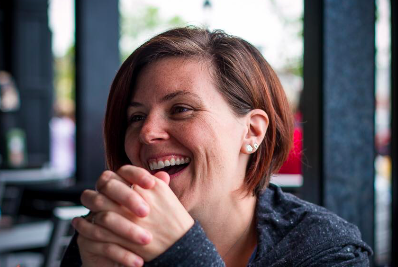If trying to juggle working from home and remote school lessons have you feeling stressed, might we suggest carving out a few minutes to dive headlong into a good book?
We hope you can find a few moments of calm and quiet this fall. Each quarter, we round up books that have caught our attention, or that we’ve published. Here are a few on the top of our list right now.
What books are you reading? Let us know at info@shareable.net! Below are summaries excerpted from each book’s website.
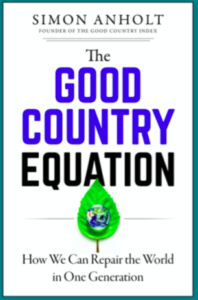 Good Country Equation: How We Can Repair the World in One Generation
Good Country Equation: How We Can Repair the World in One Generation
By Simon Anholt
Why doesn’t the world work? Why, despite all the power, technology, money, and knowledge that humanity has accumulated, are we are still unable to defeat global challenges like climate change, war, poverty, migration, extremism, and inequality?
Simon Anholt has spent decades helping countries from Austria to Zambia to improve their international standing. Using colorful descriptions of his experiences–dining with Vladimir Putin at his country home, taking a group of Felipe Calderon’s advisors on their first Mexico City subway ride, touring a beautiful new government hospital in Afghanistan that nobody would use because it was in Taliban-controlled territory–he tells how he began finding answers to that question.
Ultimately, Anholt hit on the Good Country Equation, a formula for encouraging international cooperation and reinventing education for a globalized era. Anholt even offers a “selfish” argument for cooperation: he shows that it generates goodwill, which in turn translates into increased trade, foreign investment, tourism, talent attraction, and even domestic electoral success. Anholt insists we can change the way countries behave and the way people are educated in a single generation–because that’s all the time we have.
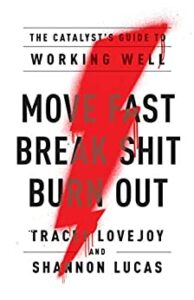 Move Fast. Break Shit. Burn Out.
Move Fast. Break Shit. Burn Out.
By Tracey Lovejoy and Shannon Lucas
This isn’t your typical changemaking book, because it’s not for your typical changemaker. It’s for the innovators who can’t stop taking in information, connecting dots, and changing the world—even when the world hasn’t asked for it. Even when the changemaker desperately needs a break.
If that sounds familiar, you aren’t broken, difficult, or an incurable workaholic. You’re a Catalyst, and authors Tracey Lovejoy and Shannon Lucas believe that means you’re a rock star. You just need to have the language to understand your process and key tools to help you survive it.
As Catalysts themselves, Tracey and Shannon work to make Catalysts better understood, connected, and supported in their processes. Instead of a how-to, they’ve created a personal operations manual that will help you move fast without losing people, break shit with intentionality, and lessen the intensity of the burnout cycle. Move Fast. Break Shit. Burn Out. won’t tell you to stop working—it will help you finally, sustainably work well.
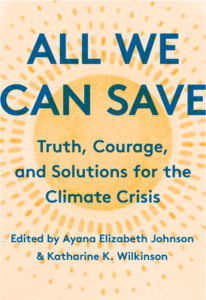 All We Can Save: Truth, Courage, and Solutions for the Climate Crisis
All We Can Save: Truth, Courage, and Solutions for the Climate Crisis
Edited by Ayana Elizabeth Johnson & Katharine K. Wilkinson
There is a renaissance blooming in the climate movement: leadership that is more characteristically feminine and more faithfully feminist, rooted in compassion, connection, creativity, and collaboration. While it’s clear that women and girls are vital voices and agents of change for this planet, they are too often missing from the proverbial “table.” More than a problem of bias, it’s a dynamic that sets us up for failure. To change everything, we need everyone.
Intermixing essays with poetry and art, this book is both a balm and a guide for knowing and holding what has been done to the world, while bolstering our resolve never to give up on each other or our collective future. We must summon truth, courage, and solutions, to turn away from the brink and toward life-giving possibility. Curated by two climate leaders, this book is a collection and celebration of visionaries who are leading us on a path toward all we can save.
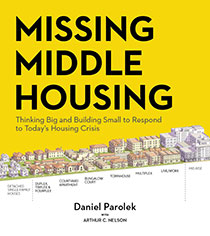 Missing Middle Housing: Thinking Big and Building Small to Respond to Today’s Housing Crisis
Missing Middle Housing: Thinking Big and Building Small to Respond to Today’s Housing Crisis
by Daniel G. Parolek
Missing Middle Housing, a term coined by Daniel Parolek, describes the walkable, desirable, yet attainable housing that many people across the country are struggling to find. Missing Middle Housing types—such as duplexes, fourplexes, and bungalow courts—can provide options along a spectrum of affordability.
In Missing Middle Housing, Parolek, an architect and urban designer, illustrates the power of these housing types to meet today’s diverse housing needs. With the benefit of beautiful full-color graphics, Parolek goes into depth about the benefits and qualities of Missing Middle Housing. The book demonstrates why more developers should be building Missing Middle Housing and defines the barriers cities need to remove to enable it to be built. Case studies of built projects show what is possible, from the Prairie Queen Neighborhood in Omaha, Nebraska to the Sonoma Wildfire Cottages, in California. A chapter from urban scholar Arthur C. Nelson uses data analysis to highlight the urgency to deliver Missing Middle Housing.
Parolek proves that density is too blunt of an instrument to effectively regulate for twenty-first-century housing needs. Complete industries and systems will have to be rethought to help deliver the broad range of Missing Middle Housing needed to meet the demand, as this book shows. Whether you are a planner, architect, builder, or city leader, Missing Middle Housing will help you think differently about how to address housing needs for today’s communities.
 Kick Start: How to Successfully Fund Your First Crowdfunding Campaign on Kickstarter
Kick Start: How to Successfully Fund Your First Crowdfunding Campaign on Kickstarter
By Cody Smith
Gone are the days where you must rely on large financial institutions or big-name investors to bring a great idea to life. No more putting on a freshly pressed suit to properly collect the puddle of sweat your body will naturally expel to deal with the nerve-racking pitch to someone in an even nicer suit.
No more needing to explain why you deserve a business loan despite not having a Ph.D. from an Ivy League business school, twenty years’ experience in your industry, and a million dollars worth of assets as collateral.
All of that is in the past, thanks to the Internet making crowdfunding accessible to just about anyone with a computer. One of the biggest names in crowdfunding makes it even easier to raise funds to bring a project to life.
The screw-ups, successes, lessons learned, and hours spent dissecting campaign after the campaign are collected in this book to give you everything you need to take your project and run it through an incredibly successful Kickstarter campaign.
 In This Together How Republicans, Democrats, Capitalists, and Activists Are Uniting to Tackle Climate Change and More
In This Together How Republicans, Democrats, Capitalists, and Activists Are Uniting to Tackle Climate Change and More
By Trammell S. Crow & Bill Shireman
For decades, the dominant narrative for environmental activism has cast crusading citizen heroes against profit-hungry corporate villains in an all-out war to save the earth. The war narrative has a basis in fact. But it has triggered a political arms race that has dragged on for a half-century, enriching political strategists while driving the world toward ecological disaster.
In This Together is part introduction, part agenda, and part strategy to save the planet from combatants on both the left and the right. Crow and Shireman show how to break the gridlock, unite the parties, and drive radical collaboration to find solutions. Their plan brings together the best ideas of conservatives and progressives and restores conservation as a bipartisan priority that can preserve our prosperity and help reclaim our divided democracy.
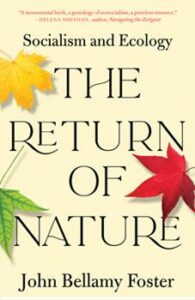 The Return of Nature: Socialism and Ecology
The Return of Nature: Socialism and Ecology
by John Bellamy Foster
A fascinating reinterpretation of the radical and socialist origins of ecology twenty years ago, John Bellamy Foster’s Marx’s Ecology: Materialism and Nature introduced a new understanding of Karl Marx’s revolutionary ecological materialism. More than simply a study of Marx, it commenced an intellectual and social history, encompassing thinkers from Epicurus to Darwin, who developed materialist and ecological ideas. Now, with The Return of Nature: Socialism and Ecology, Foster continues this narrative. In so doing, he uncovers a long history of efforts to unite issues of social justice and environmental sustainability that will help us comprehend and counter today’s unprecedented planetary emergencies. The Return of Nature begins with the deaths of Darwin (1882) and Marx (1883) and moves on until the rise of the ecological age in the 1960s and 1970s. Foster explores how socialist analysts and materialist scientists of various stamps, first in Britain, then the United States, from William Morris and Frederick Engels to Joseph Needham, Rachel Carson, and Stephen J. Gould, sought to develop a dialectical naturalism, rooted in a critique of capitalism. In the process, he delivers a far-reaching and fascinating reinterpretation of the radical and socialist origins of ecology.
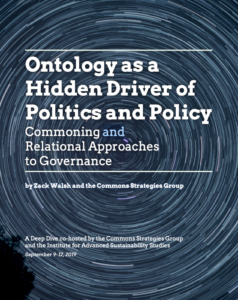 Ontology as a Hidden Driver of Politics and Policy
Ontology as a Hidden Driver of Politics and Policy
by Commons Strategies Group and the Institute for Advanced Sustainability Studies
Making an OntoShift, or ontological shift, toward process-relational ontology helps provide a better apparatus for explaining the complexity and diversity of the commons and offers much greater potential to transform society via the logic of the commons. This report builds on this insight by offering a synthesis of findings from 18 experts who, at a three-day workshop, discussed how shifting the ontological premises of political and economic thought toward process-relational ontology could transform society. The workshop, called “Onto-seeding Societal Transformation,” was co-hosted by the Commons Strategies Group and the Institute for Advanced Sustainability Studies, in Neudenau, Germany, between September 9-12, 2019. It consisted of three successive sessions focused on process-relational approaches to ontology, design patterns, and politics. A final, fourth session focused on the integration of ontology, patterns, and politics in concrete case studies. This report concludes with new questions and the next steps for strategically advancing relational approaches to governance and the commons.
 Pandemic Solidarity: Mutual Aid during the Covid-19 Crisis
Pandemic Solidarity: Mutual Aid during the Covid-19 Crisis
Edited by Marina Sitrin, Colectiva Sembrar
In times of crisis, when institutions of power are laid bare, people turn to one another. Pandemic Solidarity collects firsthand experiences from around the world of people creating their own narratives of solidarity and mutual aid in the time of the global crisis of COVID-19.
The world’s media was quick to weave a narrative of selfish individualism, full of empty supermarket shelves and con-men. However, if you scratch the surface, you find a different story of community and self-sacrifice. Looking at eighteen countries and regions, including India, Rojava, Taiwan, South Africa, Iraq, and North America, the personal accounts in the book weave together to create a larger picture, revealing a universality of experience.
Moving beyond the present, these stories reveal what an alternative society could look like, and reflect the skills and relationships we already have to create that society, challenging institutions of power that have already shown their fragility.
 The Decline and Rise of Democracy: A Global History from Antiquity to Today (The Princeton Economic History of the Western World)
The Decline and Rise of Democracy: A Global History from Antiquity to Today (The Princeton Economic History of the Western World)
by David Stasavage
Historical accounts of democracy’s rise tend to focus on ancient Greece and pre-Renaissance Europe. The Decline and Rise of Democracy draws from global evidence to show that the story is much richer―democratic practices were present in many places, at many other times, from the Americas before European conquest, to ancient Mesopotamia, to pre-colonial Africa. Delving into the prevalence of early democracy throughout the world, David Stasavage makes the case that understanding how and where these democracies flourished―and when and why they declined―can provide crucial information not just about the history of governance, but also about the ways modern democracies work and where they could manifest in the future.
Drawing from examples spanning several millennia, Stasavage first considers why states developed either democratic or autocratic styles of governance and argues that early democracy tended to develop in small places with a weak state and, counterintuitively, simple technologies. When central state institutions (such as a tax bureaucracy) were absent―as in medieval Europe―rulers needed consent from their populace to govern. When central institutions were strong―as in China or the Middle East―consent was less necessary and autocracy more likely. He then explores the transition from early to modern democracy, which first took shape in England and then the United States, illustrating that modern democracy arose as an effort to combine popular control with a strong state over a large territory. Democracy has been an experiment that has unfolded over time and across the world―and its transformation is ongoing.
Don’t forget to also check out Shareable’s growing list of free e-books (including “Sharing Cities: Activating the Urban Commons”)


